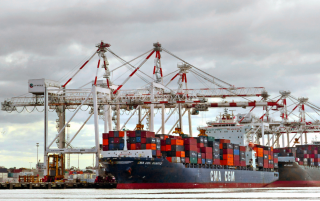Dockworkers at the DP World terminal in Melbourne, Australia refused to unload a container vessel last night citing safety risks to workers and the community.
The Maritime Union of Australia (MUA) claims that the vessel Xin Da Lian docked in breach of the Federal Government’s 14-day coronavirus quarantine period.
The union insisted that allowing the container vessel to breach the coronavirus quarantine period was simply too great a risk.
Commenting on the situation, the terminal operator said that the containership had been cleared for entry to the port last night.
“The vessel had been cleared to berth at DP World Melbourne by the Australian Border Force who is responsible for all border clearance processes in conjunction with the Department of Agriculture, Water and the Environment’s Biosecurity,” Andrew Adam, Chief Operating Officer at DP World Australia, said.
The vessel left Shanghai in China on March 17 and arrived in Melbourne on March 31. It has been out at sea for 14 days, Adam added.
As informed, the ship was carrying critical imports such as medical supplies, citing unfounded safety concerns.
“The directions are very clear, and we don’t make the rules, these are defined by Australian Border Force. Any crew members aboard a vessel that has been to mainland China, must have been at sea for 14 days before they are allowed to dock in Australia,” Adam commented.
“At all times, our priority is to keep trade flowing, and maintain the health and safety of our employees and our operations. DP World conducts rigorous safety processes on every vessel that
visit our terminals.”
visit our terminals.”
DP World Australia believes using COVID-19 related-safety concerns does a disservice to the Australian public, who rely on trade and goods from the country’s ports during these challenging times.
Workers involved in the matter were stood down by DP World Melbourne management after refusing to work the vessel.
On the other hand, MUA is calling for a suite of measures to be cooperatively implemented to protect workers and the community and to keep the supply chains operating.
“The largest cluster of COVID-19 cases in Australia — which has already claimed several lives and caused hundreds of illnesses — was the result of inadequate measures put in place for the arrival of ships. What’s the difference with this ship?” MUA Assistant National Secretary Warren Smith said.
“Wharfies don’t want to see a repeat of that blunder on the waterfront, but we still see ships allowed to dock inside of quarantine periods in breach of Australian Government Department of Health guidelines.
“An outbreak of COVID-19 on the waterfront would have a devastating impact on Australia’s supply chain given 98 percent of imports arrive by sea, disrupting the waterfront and stopping vital medical supplies, food, and household goods.
“It is vital we do everything possible to protect workers, including testing, physical distancing measures on the job, strong hygiene, cleaning, PPE and every other level of support available.”
Shipping Australia condemned the action of the Victorian branch of the union, describing the behavior “unconscionable.”
The industry body representing shipowners and shipping agents said that the 14-day quarantine period was misinterpreted by the union and that it applies to crew members who must remain onboard until the 14-day period has elapsed.
The Australian Federal government has not imposed a 14-day quarantine on commercial cargo vessels, which are permitted to berth and work cargo on arrival, the body noted.
“The Victorian MUA is attempting to create a fake narrative by cherry-picking facts from completely different sectors. Their statement intentionally confuses cruise ships with a cargo vessel,” Shipping Australia said.
The cargo vessels and cruise ships have completely different risk profiles, the industry body added, pointing to much stricter health and safety protocols, including self-isolation of the crew implemented onboard cargo ships.
Shipping Australia called on the Victorian MUA to stop its industrial action and to act responsibly and in the national interest.
MUA insists that it had been working with employers to put in place a framework based on current health advice to protect workers and ensure the resilience of maritime supply chains.
“The employers as an industry have refused to engage with the union, instead going it alone and looking to opportunistically enact essential services legislation,” Smith said.
“The MUA has been demanding improvements to biosecurity measures since January, and we will continue to fight for strict enforcement of quarantine periods, more proactive biosecurity measures, and testing for workers and crew of international vessels arriving in Australian ports and support for sick crew members.”
World Maritime News.

































































